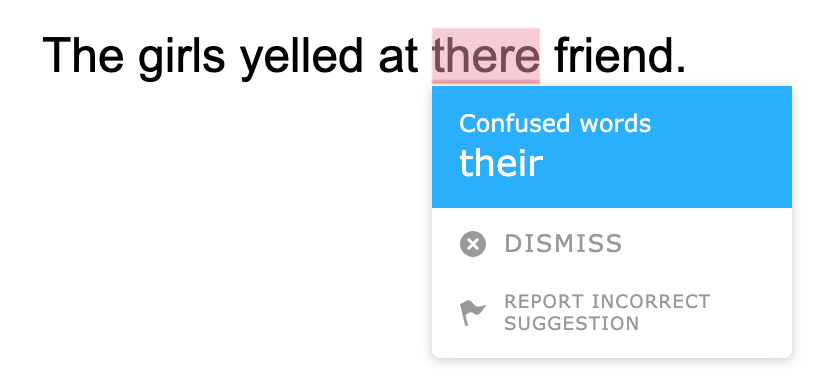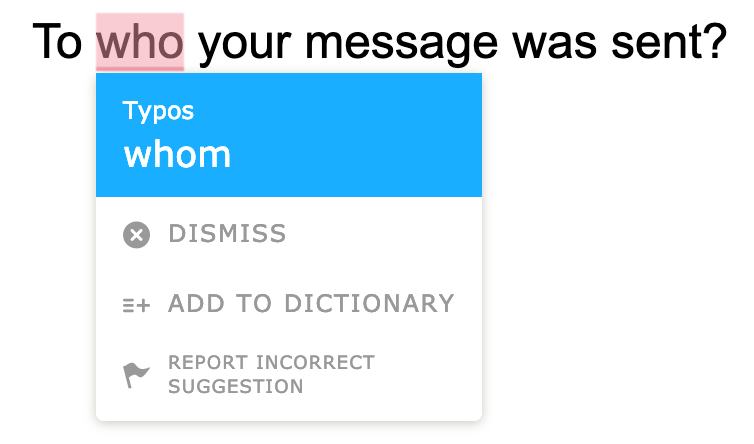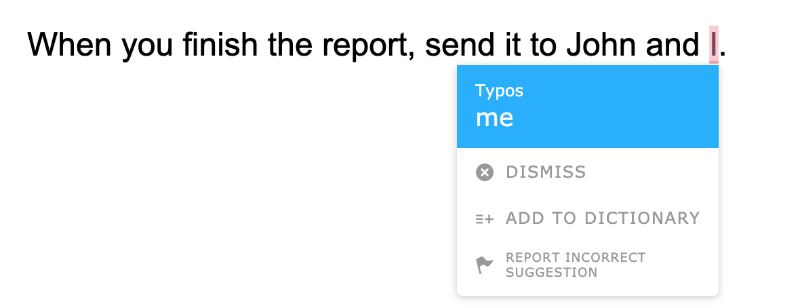Parsing: 23 popular mistakes in written English and how to avoid them
- Transfer
- Tutorial

Even if you have been studying English for many years, you are most likely making mistakes when writing. I found an interesting post with a selection of more than two dozen common mistakes and tips on how to avoid them. I present a translation of this useful material.
1. They're vs. Their vs. There
“Their” and “there” are homophones, that is, words that are pronounced the same way, but have different meanings. Mistakes in these words are most often made when you type fast. The general rule in this particular case is “there” is the opposite of “here” and refers to the place, and “their” describes ownership. Well, “they're” is simply an abbreviation for “they are” or “they were”). You can read a little more about these three homophones here .
2. Your vs. You're
As in the previous case, here we are talking about two homophones, which immediately complicates everything. In order not to make a mistake here, you need to remember that the word “your” means ownership, and “you're” is simply an abbreviation for “you are”.
Examples:
This is your decision.
Wow, you're so fast!
3. Its vs. It's
This is more complicated and mistakes are made in it even more often than in the previous two. “Its” as well as “your” or “their” stands for possession, and “It's” is an abbreviation for “it is”, but a huge number of people think that since there is an apostrophe in this abbreviation, it is this form that speaks of ownership. This is not true.
4. Could / would / should of
A mistake often made by non-native speakers. Its root is how the phrase “could have” is pronounced. When they try to reduce it to “could've”, it sounds like “could of” - and people write as they hear, and this is a mistake. It’s important to remember that could / would / should have been reduced with the addition of the particle “ve, no" of ”is not here.
False : We could of been there right now.
Right : We could've been there right now.

5. To vs. two vs. too
And again the homophones. People get confused in these three words because they sound exactly the same. Wherein:
- “To” is used in the infinitive form of the verb or makes sense “in the direction” when it comes to movement.
- “Too” means “also”.
- “Two” is just a word for 2.
False : Let's go too the party.
Right : Let's go to the party.
6. Then vs. than
Very popular puzzle for language learners. It is important to remember that “than” is used in comparisons, while “then” means something that happens later in time.
Examples:
She was a better player than him
We will go to school first, then to the playground.
7. Peek vs. Peak vs. Pique
A more subtle case of using homophones. Here, many people do not even know the meaning of words, why errors occur. The word peek means to look at something, peak is the highest point of something (the peak of a mountain), and the most difficult thing in this example is pique means to provoke, to intrigue.
To memorize these words, a mnemonic rule was invented:
- You have to reach some threshold to get to the peak. (To reach a peak, you need to overcome an obstacle).
- If you peer at something, you are peeking. (If you peer at something, you look).
- If you're piqued by or about something, this means you have some questions about it. (If you are intrigued by something, then you have questions).
8. Who vs. Whom vs. Whose vs. Who's
“Who vs. Whom ”is one of the most common“ homophonic ”errors. Type these words in Google and you will see tens of millions of results in the SERP. On this page it is painted in detail. If we talk about ways to avoid problems with these words briefly, the rule is as follows: if the object or person performing the action can be replaced by “he" or "she", then you must use "who", if "him" is better suited ”Or“ her ”, it is true to use“ whom. ”

In turn, the word“ whose ”is used to describe ownership, while“ who's ”is an abbreviation for“ who is ”:
Whose car is that?
Who's calling the customer today?
9. Who vs. That
Dealing with this pair can be very difficult. Both words are used in descriptions, but when it comes to people, you should use “who”:
Bad : Jane is a marketer that has huge experience in working with international customers.
Good : Jane is a marketer who has huge experience in working with international customers.
When it comes to an inanimate object, "that" is used:
Good : This is a car that I'd like to buy one day.
10. Alot vs. A lot vs. Allot
Millions of people really think that the word "alot" exists, but it is not. Therefore, you just need not to use it. If you want to say something that is “a lot,” then use “a lot.”
In turn, the word "Allot" exists in reality, although it is not used so often. It means “to allocate a part of something” or “to distribute something.” Example usage:
Allot five minutes for each startup pitch. (“Allocate five minutes to each startup presentation”).
11. Into vs. In to
Errors / typos are also often made in these words. To avoid this, you need to maintain attention and remember that “into” describes movement, and “in to” can be used in many different ways, and often these two words refer to different words. For example, in the phrase “call in to a game,” the particle “in” is part of the verb.
So if you need to write a sentence where something or someone is moving, then you should use "into".
12. Lose vs. Loose
Another pair of homophones. They sound identical, but the values differ dramatically. Remember: “loose” is a verb that means losing or not succeeding in a task. You can lose the game (lose a game) or lose your wallet (lose your wallet).
In turn, “loose” is an adjective that means “not tightened / tied up”. So if we are talking about a game in which someone could not win, or an object that cannot be found, then use the word with one letter o - “lose”.
13. Affect vs. Effect
In the case of these words they confuse the meaning and make mistakes when they talk about the changes provoked by some events:
Incorrect : That book effected me strongly.
The truth is that “effect” is a verb denoting the fact of change:
True : That new play had a significant effect on the audience.
If you need to say something that influenced, then use “affect”:
True : That book affected me so much!
14. Do's and Don'ts
In these words, the whole problem is in the apostrophes - especially in the word “don'ts”. Mostly mistakes are made in his case:
False : Five Do's and Dont's of content creation.
At the same time, there are two approaches and writing styles for the word “do's”. For example, The Chicago Manual of Style offers the following spelling: "dos and don'ts."
15. Me vs. I
The distinctions “me” and “I” themselves are understandable to the vast majority of language learners, but when it comes to using them in sentences, difficulties can arise.
False : When you finish the report, send it to John and I.
True : When you finish the report, send it to John and me.
To understand which word to use, you need to find the subject in the sentence. In the example above, there are two of them - I and John. But the word I should not be subject, "me" is more suitable for this.

16: Run-on Sentences and Comma Splice
Let's move on to more difficult grammatical errors. The concept of run-on sentence arises when you take two independent sentences and combine them into one without the use of punctuation marks and conjunctions. The comma splice error is similar, but in this case two independent sentences are separated by a comma, while there you also need a union.
Here are some possible solutions to this problem:
- Separate sentences with a period.
- Use a semicolon instead of a semicolon.
- Use the “and” or “but” conjunctions to replace the comma.
- Subordinate unions like “although,” “if,” “since” are suitable for the same purpose.
- A more elegant solution is to replace the comma with a semicolon along with the transition word ((“however,” “moreover”, etc.)
False : John is very good at football, he began playing in the team when he was five.
True : John is very good at football. He began playing in the team when he was five. (You can use either of five fixes above you like).
17. Errors in matching pronouns
Sometimes people forget that pronouns must be consistent in number with the nouns they refer to. If the noun is in the singular, then the related pronoun should not be plural.
False : Everybody should take their lunch box.
True : Everybody should take his or her lunch box.
18. Errors with apostrophes
In English, apostrophes are often used to express possession. However, there are possessive pronouns (my, mine, his, her, their, etc.) after which apostrophes are not used.
Incorrect : I parked next to his' car .
True : I parked next to his car.
Important: in the word “it's” the apostrophe has nothing to do with possession, it is simply an abbreviation for “it is”.
False : Its a warm day for December.
True : It's a warm day for December.

19. Errors in the coordination of verbs and subjects
If you are writing a sentence in the present tense, then the subject in the sentence must be consistent with the verb. If the subject is in the singular, then the verb must be in the singular, and if the subject is plural, the related verb must be the same.
False : These cars is good for newbies.
True : These cars are good for newbies.
20. Dangling modifiers
In order for your text to be understandable, in English the word modifier should go immediately after it. Otherwise, you get a phrase like “Approaching the station, my hat flew off”.
False : He saw a puppy and a kitten on the way to the office.
True : On the way to the office, he saw a puppy and a kitten.
21. Using 'They' to Describe a Company
On the Internet, there is often a situation where people use the word “they” when describing a company or business. The logic of this is understandable - the organization is presented as a kind of association of people about whom we can say “they”. It sounds logical, but in fact the word "company" or "business" is a singular. Therefore, the word “it” should be used in their case, and not “they.”
False : Apple is planning to release their new iPhone later this year.
True : Apple is planning to release its new iPhone later this year.
22. Incomplete comparisons
An uncritical stylistic error, but still an error that makes the text less solid. Take a look at an example:
False : Our new software is faster, more reliable, and robust.
Here we have an explicit comparison, there is an object that is compared in three ways. However, there is not the most important thing - the second object with which the comparison is made. In short, our new software is faster, more reliable and more stable than what? Than other software, the previous version of our program, something else?
The rule is that when comparing, there should always be two objects - one that is compared, and one with which the first is compared.
23. Mistakes with possessive nouns
Usually, after possessive nouns comes the apostrophe, but where exactly to put it is not always clear. Example:
All of the boy's toys were broken.
In this sentence, it is not entirely clear whether the apostrophe says that there is a certain boy whose toys have broken, or whether the word “all” at the beginning indicates the fact that there are many such boys.
Here are a few rules to keep in mind:
- If you have a plural noun, then the apostrophe comes after the letter “s” (The boys' toys).
- If the sentence contains a noun in the singular and it ends with “s”, then the apostrophe is placed after “s” (Example: the school bus' yellow color).
- If the noun in the singular does not end with "s", then the apostrophe is used in combination with "s" and goes before the letter (The boy's toys).
And what other common mistakes when writing in English do you know?
